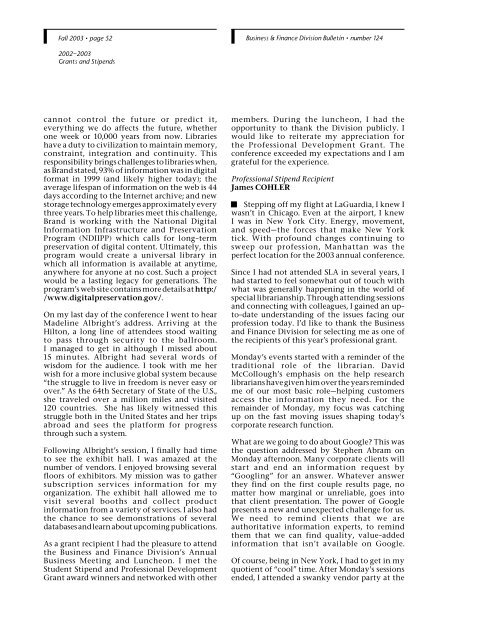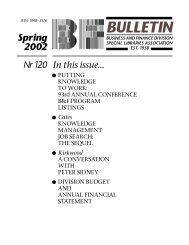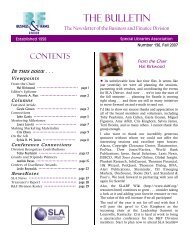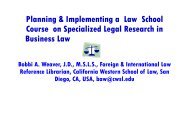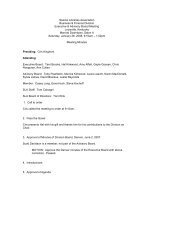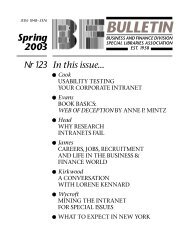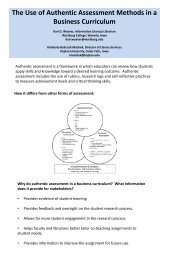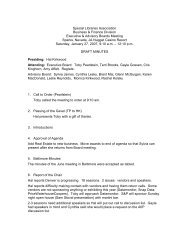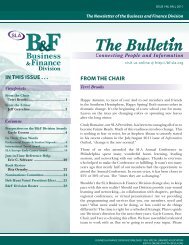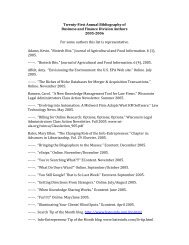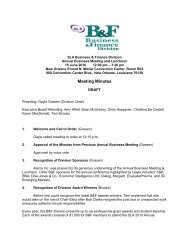bulletin - Business & Finance Division - Special Libraries Association
bulletin - Business & Finance Division - Special Libraries Association
bulletin - Business & Finance Division - Special Libraries Association
Create successful ePaper yourself
Turn your PDF publications into a flip-book with our unique Google optimized e-Paper software.
Fall 2003 • page 52<br />
2002–2003<br />
Grants and Stipends<br />
cannot control the future or predict it,<br />
everything we do affects the future, whether<br />
one week or 10,000 years from now. <strong>Libraries</strong><br />
have a duty to civilization to maintain memory,<br />
constraint, integration and continuity. This<br />
responsibility brings challenges to libraries when,<br />
as Brand stated, 93% of information was in digital<br />
format in 1999 (and likely higher today); the<br />
average lifespan of information on the web is 44<br />
days according to the Internet archive; and new<br />
storage technology emerges approximately every<br />
three years. To help libraries meet this challenge,<br />
Brand is working with the National Digital<br />
Information Infrastructure and Preservation<br />
Program (NDIIPP) which calls for long–term<br />
preservation of digital content. Ultimately, this<br />
program would create a universal library in<br />
which all information is available at anytime,<br />
anywhere for anyone at no cost. Such a project<br />
would be a lasting legacy for generations. The<br />
program’s web site contains more details at http:/<br />
/www.digitalpreservation.gov/.<br />
On my last day of the conference I went to hear<br />
Madeline Albright’s address. Arriving at the<br />
Hilton, a long line of attendees stood waiting<br />
to pass through security to the ballroom.<br />
I managed to get in although I missed about<br />
15 minutes. Albright had several words of<br />
wisdom for the audience. I took with me her<br />
wish for a more inclusive global system because<br />
“the struggle to live in freedom is never easy or<br />
over.” As the 64th Secretary of State of the U.S.,<br />
she traveled over a million miles and visited<br />
120 countries. She has likely witnessed this<br />
struggle both in the United States and her trips<br />
abroad and sees the platform for progress<br />
through such a system.<br />
Following Albright’s session, I finally had time<br />
to see the exhibit hall. I was amazed at the<br />
number of vendors. I enjoyed browsing several<br />
floors of exhibitors. My mission was to gather<br />
subscription services information for my<br />
organization. The exhibit hall allowed me to<br />
visit several booths and collect product<br />
information from a variety of services. I also had<br />
the chance to see demonstrations of several<br />
databases and learn about upcoming publications.<br />
As a grant recipient I had the pleasure to attend<br />
the <strong>Business</strong> and <strong>Finance</strong> <strong>Division</strong>’s Annual<br />
<strong>Business</strong> Meeting and Luncheon. I met the<br />
Student Stipend and Professional Development<br />
Grant award winners and networked with other<br />
<strong>Business</strong> & <strong>Finance</strong> <strong>Division</strong> Bulletin • number 124<br />
members. During the luncheon, I had the<br />
opportunity to thank the <strong>Division</strong> publicly. I<br />
would like to reiterate my appreciation for<br />
the Professional Development Grant. The<br />
conference exceeded my expectations and I am<br />
grateful for the experience.<br />
Professional Stipend Recipient<br />
James COHLER<br />
Stepping off my flight at LaGuardia, I knew I<br />
wasn’t in Chicago. Even at the airport, I knew<br />
I was in New York City. Energy, movement,<br />
and speed—the forces that make New York<br />
tick. With profound changes continuing to<br />
sweep our profession, Manhattan was the<br />
perfect location for the 2003 annual conference.<br />
Since I had not attended SLA in several years, I<br />
had started to feel somewhat out of touch with<br />
what was generally happening in the world of<br />
special librarianship. Through attending sessions<br />
and connecting with colleagues, I gained an up–<br />
to–date understanding of the issues facing our<br />
profession today. I’d like to thank the <strong>Business</strong><br />
and <strong>Finance</strong> <strong>Division</strong> for selecting me as one of<br />
the recipients of this year’s professional grant.<br />
Monday’s events started with a reminder of the<br />
traditional role of the librarian. David<br />
McCollough’s emphasis on the help research<br />
librarians have given him over the years reminded<br />
me of our most basic role—helping customers<br />
access the information they need. For the<br />
remainder of Monday, my focus was catching<br />
up on the fast moving issues shaping today’s<br />
corporate research function.<br />
What are we going to do about Google? This was<br />
the question addressed by Stephen Abram on<br />
Monday afternoon. Many corporate clients will<br />
start and end an information request by<br />
“Googling” for an answer. Whatever answer<br />
they find on the first couple results page, no<br />
matter how marginal or unreliable, goes into<br />
that client presentation. The power of Google<br />
presents a new and unexpected challenge for us.<br />
We need to remind clients that we are<br />
authoritative information experts, to remind<br />
them that we can find quality, value–added<br />
information that isn’t available on Google.<br />
Of course, being in New York, I had to get in my<br />
quotient of “cool” time. After Monday’s sessions<br />
ended, I attended a swanky vendor party at the


